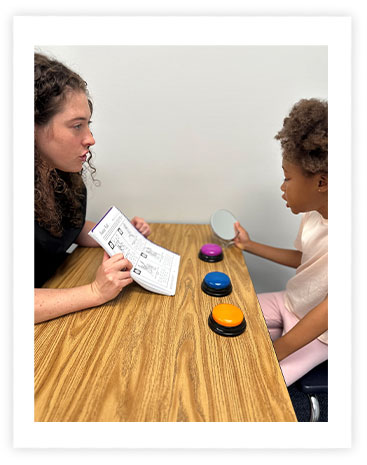Services

At Speech Connections, we work with children that have communication difficulties resulting from a variety of diagnoses such as autism, developmental delays, intellectual disabilities, learning disabilities, motor speech disorders, and various syndromes. Our speech-language pathologists are highly trained to assess and treat a variety of communication differences and disorders.
We are committed to making a difference in a child’s ability to communicate effectively. We are also committed to working with and empowering parents to implement communication strategies and home practice to maximize your child’s progress. Our therapists develop treatment programs that are highly individualized and focused on your child’s continued development while also prioritizing personal preferences and family goals.
If you have questions or concerns about your child’s speech and/or language development or would like to schedule a screening, evaluation, or speech therapy, please email us or call email us or call 804.672.8588.
“Speech Connections has really made the difference with my son, N.. Through their continued efforts, he is making the necessary connections to formulate clear and connected speech. Before he was using broken words and phrases and with their help, specifically Jenna, he is creating complete sentences. We love being a client of Speech Connections for their great work, but also the family friendly environment and the welcoming and friendly faces.”
– Traci L., Henrico, Virginia
Free screenings
We offer free screenings in our community. A speech and language screening is completed in 15-20 minutes and determines if an evaluation is recommended. We offer free screenings at our clinic location at 4110 E. Parham Rd. Suite 101 that you can schedule by calling 804-672-8588. We also have relationships with directors at daycares, preschools, and private schools and schedule annual or semi-annual screenings at their schools. If your school is not currently receiving free speech and language screenings, please reach out to us at 804-672-8588 or info@speechconnections.net or send us a message here.
Learn more about specific areas of communication below
WHAT IS CHILDHOOD APRAXIA OF SPEECH?
Childhood Apraxia of Speech (CAS) is a motor speech disorder in which the brain has difficulty coordinating the complex movements of the lips, tongue, teeth, and jaw needed for speech. Children with CAS know what they want to say, but have difficulty saying it.
WHat is articulation?
Articulation is the ability to produce speech sounds that make up words and sentences. Children are expected to be able to produce certain speech sounds at specific ages. Children with articulation difficulties may be difficult to understand by others.
What is Autism?
Autism is a neurodevelopmental difference resulting in communication differences and variations in how an individual experiences, perceives, and processes the world. Children with an autism diagnosis may have difficulty developing language skills without support and services.
what is Social and Pragmatic language?
Social communication and pragmatic language is the use of language for a variety of communicative functions (greeting, requesting, commenting, asking questions, etc.) across a variety of social situations. It includes nonverbal language skills (gestures, facial expressions, body language, eye contact) and knowing the “rules” of conversation based on who we are talking to.
What is Listening Comprehension?
Listening Comprehension is the ability to understand and make sense of spoken language.
What is Receptive Language?
Receptive Language is the understanding of information presented as spoken words, gestures, signs, and symbols.
What is Expressive Language?
Expressive Language is how a child expresses their wants, needs, and ideas using spoken words, vocalizations, facial expressions, gestures, signs, and writing.
What is Stuttering?
Stuttering is a speech difference characterized by disfluencies that may affect the flow of speech. Stuttering can sometimes be developmental where a child outgrows it by age 5. Other times, it may persist and be lifelong. Stuttering, along with feelings and emotions related to stuttering, can be managed and supported with the support of a speech-language pathologist.
What is Narrative Language?
Narrative language is the ability to retell stories or events in a sequential and organized message.
What is Phonological Awareness (pre-literacy)?
Phonological Awareness is the awareness of and the ability to blend, segment, and manipulate spoken sounds, syllables, and rhymes. These skills are necessary for developing strong reading and writing skills.
What is Augmentative and Alternative Communication (AAC)?
Augmentative and Alternative Communication (AAC) refers to various methods of communication that can be used to either add to or use instead of verbal speech. AAC includes the use of gestures, signs, picture symbols, and speech generating devices.
